Diversity is not a danger, but a treasure for the whole Church, European Eastern rite Catholic bishops
Friday, 21 October 2016, 23:11 With a heartfelt appeal to the international community for an end to the conflict in Ukraine and a reminder about persecuted Christians especially in the Middle East, the Patriarch of Lisbon, Cardinal Manuel Clemente, this afternoon in the Portuguese capital opened the meeting of the Bishops of the Catholic Eastern Rite Churches in Europe, Council of European Bishops' Conferences informs
-
See also:
- "I ask you to be worthy ambassadors of your homeland", the Head of the UGCC to those who were forced to leave Ukraine
- The head of the UGCC expresses his condolences over the repose of Bishop Emeritus Robert Moskal
- Today Russia is again committing a sin of Svyatopolk the Accursed, - The Head of the UGCC on the day of commemoration of Saints Borys and Hlib
In the Rua dos Jerónimos parish church hall, in the presence of a large delegation of bishops from Ukraine, led by His Beatitude Sviatoslav Shevchuk, Patriarch Clemente recalled the forgotten conflict in the Doneck region, inviting the international community to “take this conflict seriously” so that “private interests do not gain the upper hand over the good of peoples and peace”. Turning then to the other bishops gathered in the Portuguese capital – more than 50 bishops from 14 Catholic Eastern Rite Churches, and representatives of the Bishops’ Conferences of Germany, Italy and France – the Patriarch of Lisbon wanted to draw attention to the persecuted Churches. “Today, if your Churches are able to enjoy the fruits of re-discovered freedom, we also have the duty to remember the Churches which today are still persecuted, especially in the Middle East. So allow me to testify to the closeness of the whole of the Portuguese episcopate to the Churches in the Middle East: we do not forget you. Your martyrdom hangs over us! May the Consoler ensure you feel His presence”.
Focussing then on the theme of the meeting The pastoral care of Eastern Rite Catholic migrants in Western countries, the Portuguese Patriarch recalled how the phenomenon of the migration of thousands of Christian faithful which accompanied the fall of the Iron Curtain contributed not just to a better awareness of the ‘Catholicity’ of the Church but also to renewing it: “if years ago you were unknown by the majority of Portuguese, today your countries and your Churches have become for us names, real people, work colleagues, neighbours. This is the other side of migration. … now we don’t know you just as something heard about, but because we have seen and known you, because we have eaten, celebrated and cried with you. This experience of sharing life allows us to say with joy that your people and your Churches are a gift for all of us”.
For his part, Cardinal Leonardo Sandri, Prefect of the Congregation for the Oriental Churches, the Vatican body in charge of care for these Churches, wanted to highlight the motive and significance of this meeting, being held so close to the famous Mosteiro dos Jerónimos, where in 2007 “today’s Europe was founded” through the Lisbon Treaty. “We are here as Eastern Rite Catholic Churches in Europe because we, too, have at heart the future and identity of this continent, and we want to walk together with the Bishops of the Latin Church in order to manifest the communion and beauty of all being part of the Universal Church, which gathers to itself a variety of expressions and traditions”. In the face the phenomenon of migration which has profoundly touched the Eastern Rite Churches, too, Cardinal Sandri underlined how “the European, the Italian, Spanish, French, German, Portuguese, Polish, Hungarian [person] ... has been a migrant. We must be mindful of this from an ecclesial point of view, too”. The Cardinal Prefect recognised that “at times we were unprepared”, and the background to the migrants is not well-known “and so forms of minimalist reductionism are applied”, such as, for example, Mass in the Arabic language but according to the Latin Rite and without taking into account the different ecclesial origins where “Arabic is the largely the language of daily life, but not the instrument of ecclesial recognition and adherence”.
The opening session then concluded with greetings from His Beatitude the Greek Melkite Patriarch Gregorios III Laham of Antioch and His Beatitude Sviatoslav Shevchuk, Major Archbishop of Kyiv-Halych. The Greek Melkite Patriarch recalled how Christians in Syria are experiencing a long via crucis which has led to a “tsunami of emigrants”, with the consequent drastic reduction in the number of Christians in the country. But alongside the many sufferings experienced by the Syrians, the Greek Melkite Patriarch showed how this time of trial is also marked by a great diaconia (charitable service) among the Christians themselves, by a better and more intense relationship between the people and the church hierarchy, and by an ecumenism of life which overcomes ecclesial divisions. For his part, the Ukrainian Archbishop Sviatoslav Shevchuk stated that he saw in this “encounter-pilgrimage” an opportunity to reflect on “how to be fathers and pastors for our migrants who live in other European nations”. The leader of the Greek-Catholic Church in Ukraine also underlined the positive value of this unique migration. The faithful of the Eastern Rite Catholic Churches in Western countries are not just objects of pastoral care, but true and proper “agents of the new evagelisation”. Thanking the Patriarch of Lisbon for the appeal to end the conflict in Ukraine, Archbishop Schevchuk presented him with an icon of Our Lady of Fatima, conceived and painted precisely in the Donetsk region.
In the evening, the participants transferred to Fatima, where the remainder of the meeting will take place. This morning, at the beginning of the works, Cardinal Antonio Maria Vegliò, for some years President of the Vatican dicastery for the care of migrants, sent a message in which he underlined how “Catholics belonging to the different Eastern Rite Catholic Churches, while being a minority, represent an important, even an essential sign of the catholicity of the Church. Alongside the Latin faithful, they are in nuce the other lung of Christianity”. For the Italian Cardinal, who for years has met with refugees and migrants, “diversity is not a danger, but an undeniable treasure for the Universal Church”. Therefore it is necessary to “find the courage” to live “harmony in multiplicity or diversity”, especially in the countries historically characterised by the presence of one Rite. Finally, the Italian Cardinal recalled how the Eastern Rite Catholic Churches, even though in part different in themselves in their liturgy, ecclesiastical discipline and spiritual patrimony, nevertheless are all in the same way entrusted to the pastoral governance of the Roman Pontiff. So it falls to the Pope “who has the divine mandate of directing the choir” to do so in such a way that “there are no false notes and the symphony of truth and charity is thus guaranteed”.
The first meeting took place in 1997 in the diocese of Hajdúdorog (Hungary) and was promoted by Cardinal Achille Silvestrini, then Prefect of the Congregation for the Oriental Churches, who wanted to create a space where the bishops of those churches, which had been particularly damaged by atheistic regimes, “may find with ever greater clarity their role in today’s Europe and be loved and respected for their history of loyalty to the Church and to the Pope, paid at a dear price” (From Cardinal Achille Silvestrini’s Introduction to the Acta of the first meeting).
Source:RISU

We can imagine what the prayer of the prisoners in the Russian torture centers in the Ukrainian Kharkiv region was like – Head of the UGCC on the 206th day of the war 17 September
A vast cemetery, a mass burial, was found near the city of Izyum, in which more than 400 innocently killed and tortured people have already been...
-
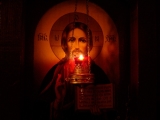 Глава УГКЦ у 158-й день війни: «Нехай Господь прийме з уст нашої Церкви псалми та моління за всіх тих, які особливо просять нашої молитви»
Глава УГКЦ у 158-й день війни: «Нехай Господь прийме з уст нашої Церкви псалми та моління за всіх тих, які особливо просять нашої молитви»
-
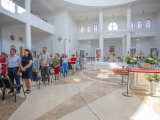 «Сила, яка походить із вірності Христові, є стержнем, який ніхто не може зламати», – Блаженніший Святослав
«Сила, яка походить із вірності Христові, є стержнем, який ніхто не може зламати», – Блаженніший Святослав
-
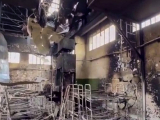 Глава УГКЦ у 157-й день війни: «В ім’я Боже ми засуджуємо звірства в Оленівці і світ повинен це засудити як особливий вияв дикості й жорстокості»
Глава УГКЦ у 157-й день війни: «В ім’я Боже ми засуджуємо звірства в Оленівці і світ повинен це засудити як особливий вияв дикості й жорстокості»
-
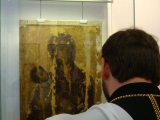 «Боже, почуй наш плач і поспіши нам на допомогу і порятунок!», – Глава УГКЦ у 156-й день війни
«Боже, почуй наш плач і поспіши нам на допомогу і порятунок!», – Глава УГКЦ у 156-й день війни
-
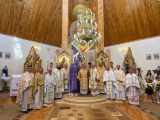 «Бог йому дав серце і душу українського народу»: відбулася щорічна проща до Прилбичів з нагоди уродин митрополита Андрея Шептицького
«Бог йому дав серце і душу українського народу»: відбулася щорічна проща до Прилбичів з нагоди уродин митрополита Андрея Шептицького
-
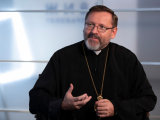 Глава УГКЦ: «Я горджуся українськими патріотами, які без найменшої краплі ненависті готові захищати своє»
Глава УГКЦ: «Я горджуся українськими патріотами, які без найменшої краплі ненависті готові захищати своє»
-
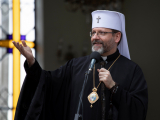 Блаженніший Святослав закликав українську молодь скласти присягу на вірність Христові
Блаженніший Святослав закликав українську молодь скласти присягу на вірність Христові
-
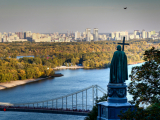 Глава УГКЦ у 155-й день війни: «Помолімося, щоб не втратити скарбу віри князя Володимира»
Глава УГКЦ у 155-й день війни: «Помолімося, щоб не втратити скарбу віри князя Володимира»
-
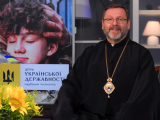 Блаженніший Святослав у День державності України: «Наша Держава – це для нас питання життя або смерті»
Блаженніший Святослав у День державності України: «Наша Держава – це для нас питання життя або смерті»
-
 Глава УГКЦ у 154-й день війни: «Нехай Господь Бог прийме у свої вічні обійми журналістів, які віддали за правду своє життя в Україні»
Глава УГКЦ у 154-й день війни: «Нехай Господь Бог прийме у свої вічні обійми журналістів, які віддали за правду своє життя в Україні»
-
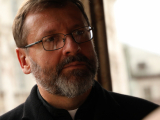 Глава УГКЦ у 153-й день війни: «Принесімо наш біль перед Боже обличчя і будьмо певні, що Він нас вислухає»
Глава УГКЦ у 153-й день війни: «Принесімо наш біль перед Боже обличчя і будьмо певні, що Він нас вислухає»
-
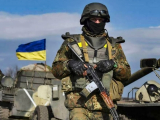 Глава УГКЦ у 152-й день війни: «Помолімся молитву заступництва за наших воїнів»
Глава УГКЦ у 152-й день війни: «Помолімся молитву заступництва за наших воїнів»
-
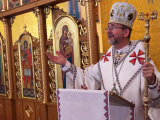 «Віруюча людина не може бути байдужою, коли бачить страждання іншої людини», – владика Богдан Дзюрах
«Віруюча людина не може бути байдужою, коли бачить страждання іншої людини», – владика Богдан Дзюрах
-
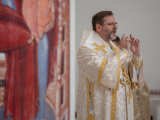 «Серед нашого страждання творімо простір для прояву Божої всемогутності», – Глава УГКЦ у 6-ту неділю після П’ятдесятниці
«Серед нашого страждання творімо простір для прояву Божої всемогутності», – Глава УГКЦ у 6-ту неділю після П’ятдесятниці
-
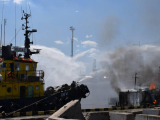 Глава УГКЦ у 151-й день війни: «Російське віроломство ми перемагаємо силою любові до нашої Батьківщини»
Глава УГКЦ у 151-й день війни: «Російське віроломство ми перемагаємо силою любові до нашої Батьківщини»

